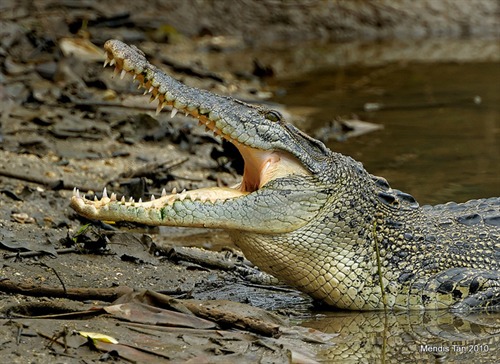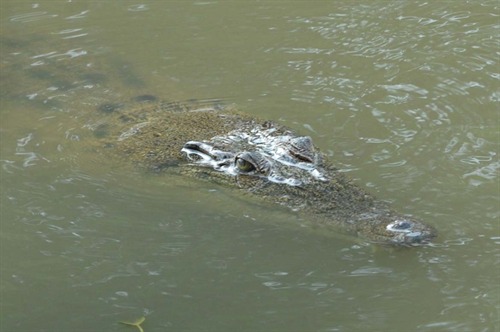
Back
Crocodylus porosus Scheneider, 1801
| Family Name: | Crocodylidae |
| Taxonomic Group: | Vertebrates (Reptile) |
| Common Name: | Estuarine Crocodile, Saltwater Crocodile |
Name
Description
| Description | Snout long and relatively broad, tail muscular and compressed; body yellow, olive or grey above with black checker-spots, and white below. |
|---|
Ecology, Habitat & Location
| Ecological Notes | In Singapore, has been recorded in estuaries and reservoirs. This amphibious creature spends most of the day basking at the water's edge or concealed among vegetation. It hunts mainly at night in the water for fish and other small animals, but also scavenges on carrion. The eggs are laid in a specially constructed nest of vegetation and savagely guarded by the female. |
|---|---|
| Distribution | In Singapore, crocodiles have been reported (and captured) from the estuaries of the Singapore and Kallang rivers, and the Sungei Seletar and Kranji Reservoirs. They have also been observed in mangrove and prawn pond areas at the Sungei Buloh Wetland Reserve and Pulau Tekong. The species is widespread throughout the Indo-West Pacific. |
| Nature Reserves | Sungei Buloh Wetland Reserve |
| Nature Areas | Pulau Tekong |
Conservation
| Trends & Threats | Habitat destruction, in particular, the estuarine mangrove belt; over-hunting for its hide and meat; human persecution because of the man-eating tendencies of large individuals. |
|---|---|
| Scientific Interest & Potential Value | Valued for its hide (quality leather for making shoes and handbags) and meat. Hatchlings are sometimes sold as pets. |
| Conservation Notes | Successful captive breeding in crocodile farms, especially in Southeast Asia and Australia, has reduced the hunting pressure on wild populations. |
Status
| Species Status | Native |
|---|---|
| Conservation Status | Rare |
| Singapore Red Data Book Status | Critically Endangered (CR) [2008], Endangered (E) [1994] |
Photos
References
| References | Baker, N. & Lim, K. 2008. Wild animals of Singapore. Singapore: Draco Publishing and Distribution Pte Ltd. 180pp Davison, G.W.H., Ng, P.K.L. & Ho, H.C (Eds.). 2008. The Singapore Red Data Book (2nd Edition). Singapore: Nature Society (Singapore). 285pp Ng, P.K.L. & Wee, Y.C. (Eds.). 1994. The Singapore Red Data Book (1st Edition). Singapore: Nature Society (Singapore). 343pp |
|---|


.jpg)